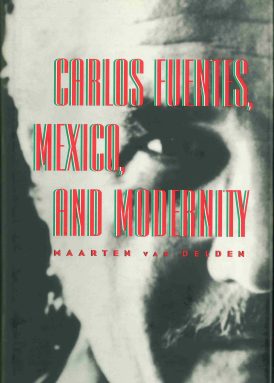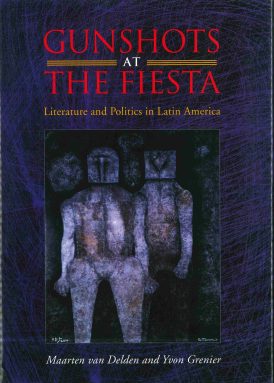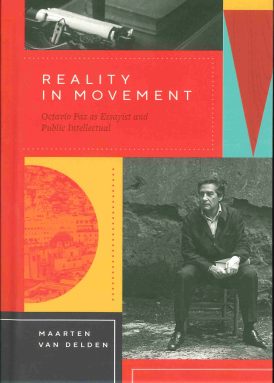Education
- Ph.D. (with distinction) (1990) Comparative Literature, Columbia University
- M.A. (cum laude) (1983) Algemene Literatuurwetenschap, Universiteit Utrecht, The Netherlands
- B.A. (first class honors) (1980) English, Cambridge University, England
Research
- Mexican Studies
- Latin American Intellectual History
- The Latin American Novel
- Literary and Cultural Relations between Mexico and the United States
- Octavio Paz
Books
-

- Carlos Fuentes, Mexico, and Modernity
- Vanderbilt University Press, 1998
-

- Gunshots at the Fiesta
- Literature and Politics in Latin America
- Vanderbilt University Press, 2009
-

- Reality in Movement
- Octavio Paz as Essayist and Public Intellectual
- Vanderbilt University Press, 2021
Articles
- Forthcoming: “Guadalupe Nettel y Octavio Paz: diálogos en torno a la libertad.” In a collection of essays on Nettel, edited by Yanna Haddaty Mora, Kristine Vanden Berghe, and Nicolas Licata.
- Forthcoming: “Carlos Fuentes’s Narrative Universe.” In The Oxford Handbook of the Latin American Novel, ed. Juan De Castro and Ignacio López-Calvo (Oxford University Press).
- 2021: Introduction to Carlos Fuentes, Valiente mundo Nuevo, translated into Chinese by Zhang Rui (Beijing: Editorial de Escritores), pp. 1-8.
- 2020: “Prólogo.” In Fabular Juárez: Marcos de guerra, memoria y los foros por venir by Willivaldo Delgadillo (Ciudad Juárez and Santa Fe, NM: Instituto para la Ciudad y los Derechos Humanos, A.C. / Brown Buffalo Press), pp. 7-11.
- 2019: “Polémicas del 68: Octavio Paz y sus críticos.” In Revista de Literatura Mexicana Contemporánea, año XXV, Núm. 77 (mayo-agosto), pp. 27-37.
- 2019. “En la mirada de Carlos Fuentes.” In Zona Octavio Paz. Web publication. (https://zonaoctaviopaz.com/espacios/en-la-mirada-de-otros/en-la-mirada-de-carlos-fuentes/)
- 2019. “La frontera entre México y Estados Unidos en el debate cultural contemporáneo: La batalla de las interpretaciones.” Special issue on “Sujetos, territorios e identidades en tránsito. Giros transnacionales en la cultura hispánica contemporánea,” ed. Adriana Bergero and Silvana Mandolessi. Nuevo Texto Crítico XXX.53, pp. 238-255.
- 2019. “En la mirada de Elena Garro.” In Zona Octavio Paz. Web publication. (https://zonaoctaviopaz.com/espacios/en-la-mirada-de-otros/en-la-mirada-de-elena-garro/)
- 2019. “En la mirada de Roberto Bolaño.” In Zona Octavio Paz. Web publication. (https://zonaoctaviopaz.com/espacios/en-la-mirada-de-otros/en-la-mirada-de-roberto-bolano/)
- 2019: “Frente a frente: Octavio Paz y Alejandro Solzhenitsyn.” In Zona Octavio Paz. Web publication. (https://zonaoctaviopaz.com/espacios/conversacion-y-novedades/frente-a-frente-octavio-paz-y-alejandro-solzhenitsyn/)
- 2018: “El romanticismo de Alfonso Reyes.” In Antonio Colinas et al., Una lectura crítica de El plano oblicuo de Alfonso Reyes (México: Secretaría de Producción Editorial, FFYL, UANL), pp. 69-80.
- 2018: “Carlos Fuentes y Pablo Neruda: Entre el homenaje y la parodia.” In Deslinde: Revista de la Facultad de Filosofía y Letras, Universidad Autónoma de Nuevo León, Nueva época, No. 72 (enero-diciembre), pp. 275-286.
- 2017: “El ensayo de identidad nacional mexicano en la época posnacional: Mexicanidad y posmexicanidad en Jorge Castañeda y Heriberto Yépez.” Special issue on “La dimensión transnacional del ensayo hispánico,” ed. Reindert Dhondt and Dagmar Vandebosch. Anales de Literatura Hispanoamericana 46, pp. 75-87.
- 2017: “Íntimos Enemigos: Carlos Fuentes y Estados Unidos.” In Carlos Fuentes y el Reino Unido, ed. Steven Boldy (México: Fondo de Cultura Económica), pp. 159-175.
- 2016: “Carlos Fuentes: Many Mexicos, Many Revolutions.” In Equestrian Rebels: Critical Perspectives on Mariano Azuela and the Novel of the Mexican Revolution, ed. Roberto Cantú (Newcastle upon Tyne: Cambridge Scholars Publishing), pp. 262-279.
- 2016: “Octavio Paz: Literature, Modernity, Institutions.” In Cambridge History of Mexican Literature, ed. Ignacio Sánchez Prado et al., (New York: Cambridge University Press), pp. 278-294.
- 2015: “Hands-on Modernism: Touch and Gesture in Carlos Fuentes’s La muerte de Artemio Cruz.” In The Reptant Eagle: Essays on Carlos Fuentes and the Art of the Novel, ed. Roberto Cantú (Newcastle upon Tyne: Cambridge Scholars Publishing), pp. 36-50.
- 2015: “El rebelde en Paz.” In Aire en libertad: Octavio Paz y la crítica, ed. José Antonio Aguilar Rivera (México: Fondo de Cultura Económica/Centro de Investigación y Docencia Económicas), pp. 171-193.
- 2015: “La idea de la democracia en Roger Bartra.” In Democracia, otredad, melancolía: Roger Bartra ante la crítica, ed. Mabel Moraña and Ignacio Sánchez Prado (México: Fondo de Cultura Económica / Conaculta), pp. 93-111.
- 2014: “The Holocaust in Mexican Literature.” In European Review 22.4 (October), pp. 566-574.
- 2014: “Vanguardia británica/modernidad mexicana: La imagen del México posrevolucionario en La serpiente emplumada de D.H. Lawrence.” In La Revolución mexicana: Miradas desde Europa, ed. Kristine Vanden Berghe (Brussels: Peter Lang), pp. 99-112.
- 2014: “Double Itinerary: Narratives of the Revolution in Octavio Paz.” In The Willow and the Spiral: Essays on Octavio Paz and the Poetic Imagination, ed. Roberto Cantú (Newcastle upon Tyne: Cambridge Scholars Publishing), pp. 156-169.
- 2013: “Carlos Fuentes, Mexico and the United States.” PMLA 128.3 (May), pp. 723-726.
- 2012: “Máscaras mexicanas en La región más transparente.” In La región más transparente en el siglo XXI: Homenaje a Carlos Fuentes y a su obra, ed. Georgina García Gutiérrez (México: Universidad Nacional Autónoma de México / Fundación para las Letras Mexicanas/ Universidad Veracruzana), pp. 145-158.
- 2012: “Breve retrato de Carlos Fuentes.” In Araucaria: Revista Iberoamericana de Filosofía, Política y Humanidades, año 14, número 28, pp. 203-208.
- 2012: “Mirando hacia París: La presencia del debate intelectual francés en la revista Plural de Octavio Paz.” In Las revistas en la historia intelectual de América Latina: Redes, política, sociedad y cultura, ed. Aimer Granados (México: UAM Cuajimalpa / Juan Pablos Editor), pp. 195-209.
- 2012: “Aborrecer lo típico: México y Estados Unidos en Days of Obligation de Richard Rodriguez.” In El juego con los estereotipos: La redefinición de la identidad hispánica en la literatura y el cine posnacionales, ed. Nadia Lie, Silvana Mandolessi and Dagmar Vandebosch (New York and Bern: Peter Lang/Théocrit), pp. 157-170
- 2010: “Latin America and Europe in José Lezama Lima.” In Baroque New Worlds: Representation, Transculturation, Counterconquest, ed. Lois Parkinson Zamora and Monika Kaup (Durham, NC: Duke UP), pp. 571-596.
- 2009: “El intelectual como terapeuta: Octavio Paz y el psicoanálisis del mexicano.” In El hispanismo omnipresente: Homenaje a Robert Verdonk, ed. An Van Hecke et al. (University Press Antwerp), pp. 499-506.
- 2009: “La pura gringuez: The Essential United States in José Agustín, Carlos Fuentes, and Ricardo Aguilar Melantzón.” In Reading the United States from Mexico, ed. Linda Egan and Mary K. Long (Nashville, TN: Vanderbilt UP), pp. 154-176.
- 2008: “Abish and Proust.” In 99 Arten das “Ich” und die Welt zu erfinden. Walter Abish: Materialien, Analysen, Gespräche, ed. Robert Leucht. (Bonn: Weidle-Verlag), pp. 62-87.
- 2007: “The Spanish-American Novel and European Modernism.” In Modernism, ed. Astradur Eysteinsson and Vivian Liska (Amsterdam: John Benjamins), pp. 947-965.
- 2007: “The Museum and the Opera House: Modernity and Identity in Alejo Carpentier’s Los pasos perdidos.” In Caribbean Interfaces, ed. Lieven d’Hulst, Jean-Marc Moura, Liesbeth De Bleeker and Nadia Lie (Amsterdam: Rodopi), pp. 47-65.
- 2006: “Polemical Paz.” In Literal: Latin American Voices 7, pp. 16-18.
Courses
Spanish 280A:
The Twentieth-Century Mexican Novel
How did Mexican novelists respond to the enormous changes that took place in their country in the twentieth century? What literary innovations did they develop as they sought to capture new ways of looking at the world around them? These are the questions that will guide us as we read key Mexican novels from the 1910s to the 1990s. Among other topics, we will look at how Mexican writers responded to the Mexican Revolution, at their portrayals of indigenous peoples, and at their views of mass society and consumer culture. We will examine the new techniques twentieth-century Mexican authors developed to create more refined representations of the inner worlds of their characters, as well as more accurate portrayals of the experience of living in a modern society. Authors studied include Mariano Azuela, Juan Rulfo, Rosario Castellanos, Carlos Fuentes, Jorge Ibargüengoitia, José Agustín, and Cristina Rivera Garza. The class will also read selected critical texts that approach the novels studied from the perspective of subaltern studies, indigenismo, modernist and postmodernist aesthetics, feminism, narrative theory, and psychoanalysis.
Spanish 290:
Octavio Paz
Mexican poet and essayist Octavio Paz had an extraordinarily rich and varied literary career that spanned more than six decades of the twentieth century. Working in the symbolist and avant-garde traditions, he produced some of the most enduring poetic works of the modern era in Latin America. As an essayist he wrote incisively and elegantly on a vast array of topics, including the Mexican national character, national and international politics, the visual arts, poetry and modernity, linguistics, anthropology, love and eroticism, Asian cultures, and the biographies of many of the distinguished writers and artists he met in the course of his long career. Christopher Dominguez Michael once stated that the twentieth century was the century of Octavio Paz in Mexican literature, while Irving Howe called Paz a “hombre orquesta.” This course will attempt to give a sense of the importance and diversity of Paz’s work through close readings of some of his major poems and essays. We will also examine the controversies that swirled around Octavio Paz as he evolved from a leftist and pro-revolutionary standpoint in the 1930s to a pro-democracy and free market outlook in the 1980s and 90s.
